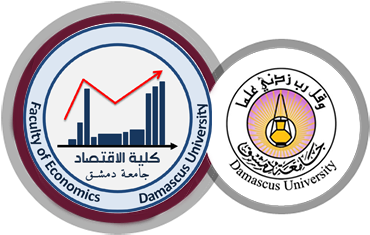- الرئيسية
- عن الكلية
توصيف مقررات كلية الاقتصاد
لمحة عن الكلية
رسالة الكلية
الخطة الدرسية
توصيف المواد
الهيكل التنظيمي لكلية الاقتصاد
شعار كلية الاقتصاد
أقسام الكلية والمقررات
الهيئة التدريسية
إدارة الكلية
وحدة ضمان الجودة والاعتمادية
المؤلفات والبحث العلمي
مواقع التواصل الاجتماعي
الشهادات التي تمنحها الكلية
إدارة الموقع الالكتروني
الموقع الجغرافي لكلية الاقتصاد
- شؤون الطالب
مواد التحويل المماثل
رسوم التسجيل
الأوراق المطلوبة للتسجيل وللحصول على الوثائق
فرص دخول كلية الاقتصاد لحامل الشهادة الثانوية المهنية التجارية وخريجي المعاهد التجارية
العام الدراسي الحالي 2023- 2024
دليل الطالب
محاضرات وكتب جامعية
الأوراق المطلوبة للتسجيل
المساعدات الامتحانية للطلاب
أسماء المتفوقين
رابط المجموعة الرسمية للكلية-طلاب ودكاترة
رابط مجموعة فيسبوك الهيئة الادارية
صفحة الفيسبوك الرسمية لكلية الاقتصاد
كيفية بيان صحة الوثائق الجامعية إلكترونياً
البرامج التدريسية
- النتائج الامتحانية
- الدراسات العليا
- مكتب ممارسة المهنة
- فعاليات كلية الاقتصاد
آخر الأخبار
ملخص رسالة ماجستير بعنوان (الدَّين العام وأثره على العرض النقدي دراسة تطبيقية مقارنة للدول (سورية – لبنان – العراق) خلال
الجمهورية العربية السورية وزارة التعليم العالي والبحث العلمي
جامعة دمشق– كلية الاقتصاد
قسم المصارف والتأمين
ماجستير علوم مالية ومصرفية
الدَّين العام وأثره على العرض النقدي
دراسة تطبيقية مقارنة للدول (سورية – لبنان – العراق)
خلال الفترة (2020-2010)
Public Debt and Impacts on the Money Supply A Comparative Applied Study for the Countries of Syria, Lebanon and Iraq
During (2010-2020)
رسالة مقدمة استكمالاً لمتطلبات الحصول على درجة الماجستير في العلوم المالية والمصرفية
إعداد الباحثة:
فاطمه عمار سفور
إشراف الأستاذ الدكتور:
عبد الرزاق حسن حساني
1445ه-2024م
ملخص الدراسة
هدفت الدراسة لمعرفة أثر الدين العام على العرض النقدي نظراً لأهميتهما وأثرهما في الاقتصاد الوطني، وتمت الدراسة في إطار اقتصاد بعض الدول العربية (سورية ولبنان والعراق) في المدة (2020-2010).
وقد عُرضت الدراسة بالاعتماد على المنهج الوصفي التحليلي، وتم إنجازها بثلاثة فصول، تناول الفصل الأول الدَّين العام و المفاهيم الأساسية له، وأهميته وآثاره، فضلاً عن محور استدامة الدَّين العام، الذي يعد من الأهداف المهمة لحكومة أي دولة، وتناول الفصل الثاني نظرية العرض النقدي كمتغير خارجي وداخلي والآثار المحتملة للمديونية العامة على العرض النقدي، أما الفصل الأخير وبعد عرض الإطار النظري للدراسة قامت الباحثة بإجراء الدراسة التطبيقية بالاعتماد على البيانات سنوية للفترة (2010-2020) وباستخدام برنامج Excel لتحليل أبرز التطورات الاقتصادية، ومن ثم تم تطبيق اختبار التكامل المشترك باستخدام نموذج الانحدار الذاتي لأوقات الإبطاء الموزعة ARDL ونموذج متجه الانحدار الذاتي VARلاختبار العلاقة بالاعتماد على برنامج Eviews12.
وتوصلت الباحثة إلى أن الدَّين العام يعدُّ محدداً رئيسياً للعرض النقدي، فقد لوحظ باختبار العلاقة في سورية والعراق بأنه يوجد أثر موجب للدين العام في كل من (M1,M2)، أما في لبنان وجد بأن أثر الدين العام في (M1) موجب، في حين كان أثره معنوي وعكسي في (M4) وبالتالي تحققت نظرية المحفظة المالية إذ تترك مختلف الجهات الاقتصادية أثراً في تحديده.
ومن أهم التوصيات التي تم التوصل إليها تحقيق التنسيق الفعَّال بين السلطتين النقدية والمالية، وإضفاء المزيد من الاستقلالية للبنك المركزي بتطوير الكفاءات ومراعاة سمات كل دولة والاستفادة من المبادرة التي يقدمها كل من صندوق النقد الدولي والعربي لتعزيز قدرتها في إدارة الدين العام وتطوير أسواقها المالية، ومن المفيد طرح الصكوك الإسلامية لتوفير موارد مالية تدعم الاقتصاد.
الكلمات المفتاحية: الدَّين العام، العرض النقدي، استدامة الدَّين العام
Abstract
This study aims to determine the impact of public debt on the money supply due to their importance and role in the national economy. The study is conducted within the framework of the economy of some Arab countries (Syria - Lebanon- Iraq) during the period (2010-2020). The study was completed based on the descriptive analytical approach and was completed in three chapters. The first chapter deals with public debt, its basic concepts, importance and effects, in addition to the sustainability of public debt, which is considered one of the important goals of the government of any country. The second chapter deals with the theory of money supply as an external and internal variable and the potential effects of public debt on the money supply. As for the last chapter, the researcher conducted the applied study relying on annual data for the period 2010-2020 and using the Excel program to analyze the most prominent economic developments and then applied the cointegration test using the autoregressive model for distributed lag periods and the autoregressive vector model were applied to test the relationship relying on the eviews12 program. The study concludes that public debt is considered a major limiter of the money supply. More as over, and as was observed through testing the relationship in Syria and Iraq that there is a positive effect of public debt on each of (M1,M2), while in Lebanon it was found that the effect of public debt on (M1) is positive, while It had a significant and inverse effect on (M4), and thus the financial portfolio theory was fulfilled, as various economic entities leave an impact in determining it. The study recommends were achieving effective coordination between the fiscal and monetary authorities and giving more independence to the central bank by developing competencies, taking into account the characteristics of each country, and initiative benefiting from the initiative by both the International and Arab Monetary Fund to enhance its ability to manage public debt and develop its financial markets. IT is useful to offer Islamic bonds to provide financial resources that support economy.
Key Words: Public Debt, Money Supply, The Public Debt Sustainability
Syrian Arab Republic
Ministry of Higher Education and Scientific
Research
Damascus University - Faculty of Economics
Department of banking and insurance
Master of Finance and Banking Sciences
Public Debt and Impacts on the Money Supply
A Comparative Applied Study for the Countries of
Syria, Lebanon and Iraq
During (2010-2020)
Prepared by:
Fatimah Ammar Saffour
Supervised by Professor Dr:
Abdul Razak Hassan Hasani
2024-1445
|






